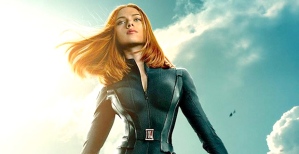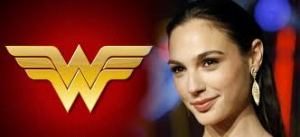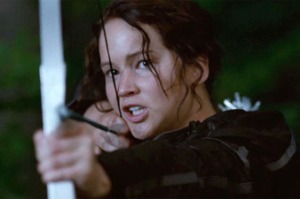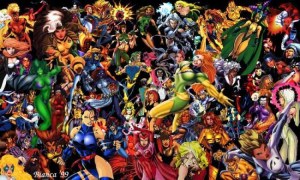If nothing else, at least the Captain America sequel solidified the call for a Black Widow movie. According to Justin Craig at Fox News, Scarlett Johansson “is quickly becoming the smartest, toughest female action star. . . . Forget Captain America 3 or The Avengers 2, it’s time ScarJo gets her very own Marvel franchise.” Slate’s Dana Stevens even thinks Johansson’s “dryly funny Natasha at times comes perilously close to being … a well-developed female character?” That’s high praise in a genre bereft of leading women.
Why are Batman and Superman onto their third film incarnations, while Wonder Wonder still wallows in 70s TV? Presumably Warner Brothers’ hiring of actress Gal Gadot for the Man of Steel sequel will change that, but the company is making no promises for a stand-alone venture. When asked about her own movie prospects, Johansson had to writhe her way around Marvel’s non-commitment: “Sure, we talk about it all the time. You know, I think it’s something that, um, again I think Marvel is is certainly, um, listening, and if, you know, working with them for several years now, you kind of see how, ah, they respond to the audience, um, demand I think for something like that.”
You’d think Marvel and Warner never heard of Jennifer Lawrence or the profits Lionsgate is earning from Hunger Games. Not that Lawrence is the leader of a new trend. Her cartoon counterparts changed gender barriers a decade ago. I’m looking at a 2007 study by Kaysee Baker and Arthur Raney, “Equally Super?: Gender-Role Stereotyping of Superheroes in Children’s Animated Programs.” Even though they’d read one 2004 study that found “no significant differences in aggression between male and female characters,” they still predicted that “Male and female character will be portrayed in significantly different and gender-role stereotypical ways.” They were wrong. Yes, men outnumbered women almost two-to-one, but those men were no longer portrayed as more intelligent, brave, dominant, technical, or task-oriented. And those women were no longer portrayed as more dependent, jealous, romantic, affectionate, sensitive, domestic, damsel-prone, follower-minded, or likely to cry. And both groups “were portrayed as virtually equal in terms of physical aggression.”

If you don’t remember what cartoon superheroes were romping around TV in 2007, I do. My son and daughter had recently grown out of Teen Titans and Justice League, but Cartoon Network was keeping both teams alive in reruns. So, yes, I remember Hawkgirl clubbing the shit out of Martian spacecraft with that mace of hers, and Raven could have dropped the Titan Tower on Robin’s head any time she liked. “One way to interpret these findings,” write Baker and Raney, “would be to proclaim that female superheroes are finally breaking down the gender-based stereotypes that have permeated children’s cartoons for decades.” Instead, the authors spin their findings in the opposite direction: “Adding the masculine trait of aggression to a character who is already portrayed as having traditional feminine traits such as being beautiful, emotional, slim, and attractive, while also losing other more prominent feminine stereotypes (i.e., domesticity, passivity), might suggest that to be heroic, one has to be more masculine, regardless of gender.” Although the authors use the term “masculine” (meaning socially determined) rather than “male” (biologically), I still sense a hint of essentialist nostalgia for those good ole days when men were men and women were, you know, not men. Because if aggression is now gender-neutral, how can being aggressive also be “more masculine”?
However Baker and Raney interpret their data, news of their findings hasn’t revolutionized the culture. There’s a hell of lot more than a hint of essentialist nostalgia in the comments section for a Walking Dead review at the movie blog. When Darren Mooney criticized Tony Kirkman for presenting old school gender attitudes as “unquestioned near-universal truth,” a reader responded: “Seems fairly natural that the group would default to the standard lineup, where men protect the women. In case you haven’t noticed, men are far more aggressive and stronger by nature.”
Don’t tell Gal Gadot. Sure, she looks like a skinny little thing, but after winning Miss Israel in 2004 the next Wonder Woman served two years in the Israel Defense Forces. Israel is one of the few countries that requires military service for both genders—and since a 2000 amendment to the law, that’s meant women having an equal right “to serve in any role in the IDF,” including in combat. The new gender norm has made it across the West Bank border too. The Presidential Guards, the most elite Palestinian military force, currently includes 22 female commandos-in-training. They even look like superheroines since their combat fatigues come with headscarves.
The toy industry is catching on too. The New York Times reported in March: “Toy makers have begun marketing a more aggressive line of playthings and weaponry for girls–inspired by a succession of female warrior heroes like Katniss, the Black Widow of The Avengers, Merida of Brave and now Tris of the book and new movie Divergent–even as the industry clings to every shade of pink.” Actually, the Nerf Rebelle Heartbreaker Exclusive Golden Edge Bow looks purple to me, but it still gets child psychologist Sharon Lamb’s approval: “I don’t see this as making girls more aggressive, but instead as letting girls know that their aggressive impulses are acceptable and they should be able to play them out.”
Meanwhile DC and Marvel, those vanguards of radical feminism, continue to dither over the box office viability of any superhero movie starring a woman. Because, you know, women are, uh, not naturally, um, like that.




While I agree that it is well-past time for some well supported well-written/directed/acted superhero movies and TV shows starring women leads, I think the Hunger Games comparison a lot of folks seem to make is off-base. Those movies came with a built in audience specifically interested in that story and that main character from the best-selling book series. We are talking 10s of millions of copies before the first movie even came out! Film executives are not going to turn that down.
How many Wonder Woman comics sell in comparison? About 30k a month? (I’m guessing)
Now, I am not trying to use this data to justify the reticence to back a Wonder Woman movie – but just to say that support for one woman-driven action/adventure movie does not necessarily translate to another.
The popularity of Black Widow in other successful films, however, does seem like greater evidence of her potential success – which, I am sure DC/Warner Bros folks notice – thus their trying to emulate that model with Wonder Woman.
I think it is cowardly and stinks, esp. given how much money is wasted on bombs every year, but the J-Law comparison seems like wishful thinking.
This is an encouraging post, but I think Osvaldo’s counterpoint is valid. The accomplishment (post-Buffy, Lara Croft, Salt, and more) is that it’s no longer about whether action heroines can make money at the box office. It’s about whether this particular one will. Wonder Woman has been an awkward property for DC since Marston (with his singular-but-weird vision) left the book. People love that she exists as an icon, but they don’t actually want to read about her much. That doesn’t mean a movie couldn’t work, and the TV series was successful, but it means it’s a greater risk — a potential Green Lantern, instead of a Batman.
Regarding your other example, Black Widow doesn’t have a huge, fiercely loyal fan base from the comics, either. However, the Marvel films (and Johannson) portray her as such a fascinating character that Marvel may soon decide there’s not much risk at all.
Thor, Captain America, Iron Man, Hulk, Green Lantern, Green Arrow, Flash, NONE of those properties had a major fan platform (when compared to Hunger Games or the more iconic superheroes like Batman, Superman or even Spider-Man), but they all got franchises (or attempts) while no films or TV shows have featured superheroines. The hesitancy (in light of other female lead successes) doesn’t really make much sense.
I’m sure it makes sense to some movie marketing executives. I’m sure it goes something like….. action-superhero movies are targeted at men and the women just tag along. With increasing recognition of the female demographic, we are now focusing more on beefcake – hence the innumerable shirtless scenes by Hugh Jackman and Stephen Amell. Something like a Wonder Woman or Black Widow movie doesn’t have the right optics or hit sufficient buttons for a mega blockbuster (meaning >500 mil cleared) etc. etc.. OTH.., Tomb Raider the video game. The one franchise which “doesn’t make sense.”
However, note that there are now a few small movies starring actresses who can actually fight in real life – Caity Lotz and Gina Carano.
I still think the Hunger Games comparison doesn’t work. I think Thor is a much better point of comparison.
I’m not really arguing with you, Chris. I just think (and this is just my guess) that the barrier is risk aversion, and I empathize, because if a superheroine film is a flop commercially or critically (like the eighties Supergirl movie, to name only one example), Hollywood will be skittish for years. The assumption will be that you can make female action heroes work as long as they don’t wear spandex or have powers. So I’d like two solid wins in a row to prove the point that it can work. The current superhero-friendly environment is probably the best opportunity, but they have to take advantage of it quickly, since we don’t know when tastes will change.
Postpartum Johannson is an obvious choice. WW could work, but she’s mishandled as often as not. Gadot’s performance may be the best indicator on that one. Will the Ant-Man movie have the Wasp? A duo would add variety and probably break other Hollywood assumptions, if successful.
Wait! How about the new Ms. Marvel? That would be an intriguing choice.
I wrote my last comment before reading Noah’s latest essay, Chris. I’m feeling a little Johnny-come-lately now….
That’s how I feel most of the time, John.